
I started reading about New Zealand quite a few years ago as I have always had an interest in other philosophies and perspectives on early childhood education. What struck me about Te Whariki, which guides pedagogy and practice in NZ, was the complete focus on the child and family and looking at children's learning through their dispositions. It is a respectful view point - which really sees children's potential and acknowledges the imaginative depths of their thinking and learning. The nearest equivalent that we have in England would be the Characteristics of Effective Learning. Our previous EYFS Curriculum Guidance had some links to Te Whariki particularly in the Themes and Principles (which are still statutory) but this has been even more marginalised in the revised EYFS.
The similarities are mainly with the Themes and Principles of the EYFS - have a look at the following:
Te Whariki EYFS Themes and Principles
Well - Being Unique Child and Positive Relationships
Exploration Unique Child and Learning and Development
Communication Unique Child and Learning and Development
Contribution Unique Child and PositiveRelationships
Belonging Unique Child and Positive Relationships
This is a bit of a rough comparison as in reality all these themes and principles are interlinked and woven together in fact that is what Te Whariki means. It is a Maori word meaning 'woven mat' .....so a metaphor for children's thinking, learning and lives. Malaguzzi explained this in typical style by saying that children's thinking and learning was like 'spaghetti' with everything tangled and intertwined.......thats how we need to think of children's development, especially their thinking..anyone who has worked with (and understands) young children will know that it is not a neat tidy process......so trying to put children's learning into boxes is not a natural or helpful thing to do.....unfortunately we live in an educational world (in England) that does just that! More on that later.......